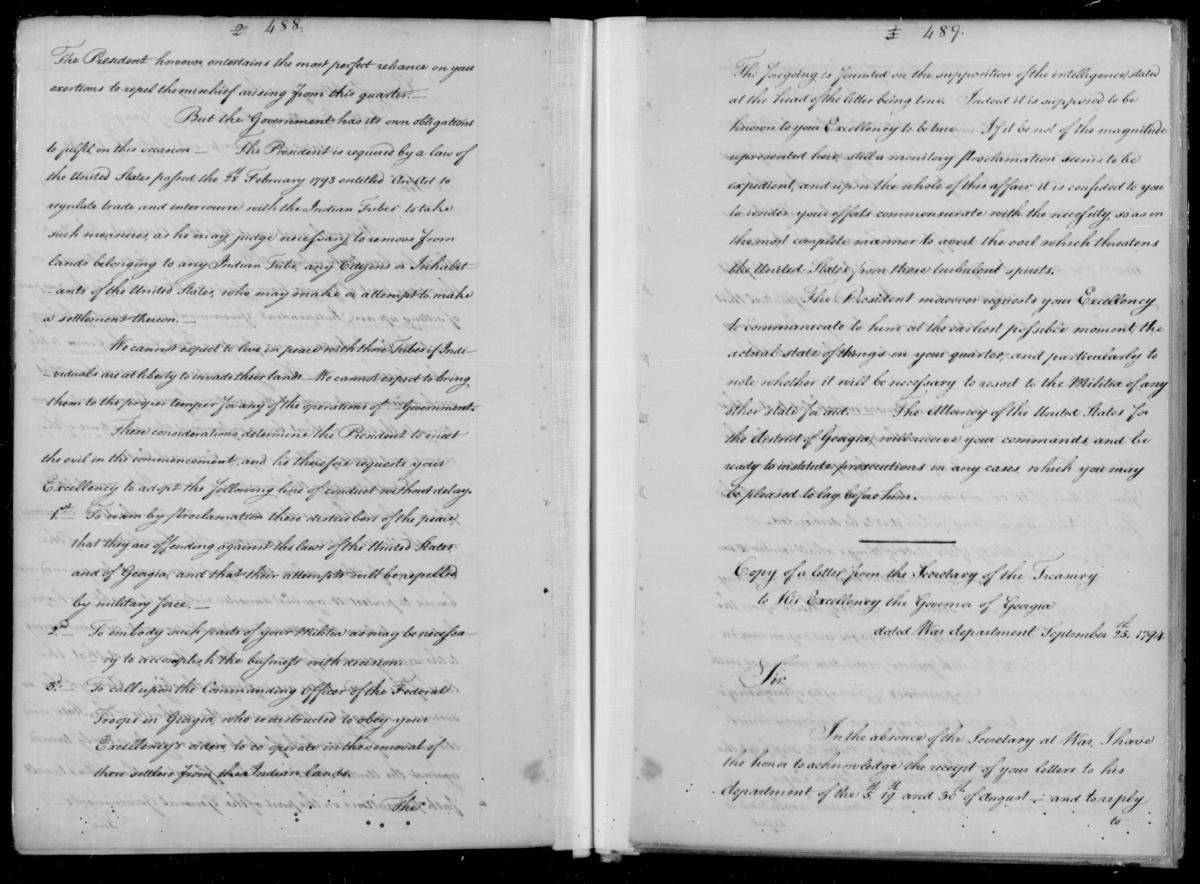
Record Group 107: Records of the Office of the Secretary of War
The National Archives houses historical records of the Office of the Secretary of War in Record Group 107. These records include correspondence and reports documenting the Secretary of War’s responsibility over federal Indian affairs until 1849, military campaigns against American Indian tribes throughout the 19th century, and military expeditions to Alaska in the late 19th century, among other topics.
Agency Overview
Congress created the position of Secretary of War when it established the War Department on August 7, 1789 (1 Stat. 49). In addition to overseeing military and naval affairs, the Secretary was given direct responsibility for most federal activities related to Indian affairs. An exception was the federally-operated factory system of trade with American Indian tribes, which was overseen by the Office of Indian Trade between 1806 and 1822.
Federal activities related to Indian affairs expanded during the early 19th century, leading Secretary of War John C. Calhoun to create a separate office within the War Department to manage Indian affairs in 1824. The Office of Indian Affairs was given statutory authority in 1832 (4 Stat. 564) and remained within the War Department until its transfer to the Department of the Interior in 1849 (9 Stat. 395).
Even after 1849, however, the War Department—and by extension, the Secretary of War—was heavily involved in federal Indian affairs, coordinating military campaigns against American Indian tribes and expeditions to Alaska throughout the mid- to late 19th century.
Records Overview
The National Archives in Washington, DC, houses 19th-century textual records of the Office of the Secretary of War in Record Group 107.
Records predating 1814 are fragmentary and incomplete due to two fires in Washington, DC. The first occurred on November 8, 1800, in the War Department, and the second happened when the British ransacked and burned a number of government buildings during the War of 1812. The Office of the Secretary of War later transferred many surviving letters related to American Indian affairs during this period to the Office of Indian Affairs. These records are now part of Record Group 75, Records of the Bureau of Indian Affairs (BIA). See BIA Correspondence Files—Time Period: 1800–1823.
However, numerous records related to American Indians and Alaska Natives remain in Record Group 107. These records include correspondence, reports, and applications for Indian agent positions.
Select series are listed below. For the full archival records descriptions in the National Archives Catalog, please select the National Archives Identifiers provided. For questions related to these series, please email the Archives 1 Reference Branch at archives1reference@nara.gov.
Correspondence
- “Correspondence Relating to Indian Affairs, Military Pensions, and Fortifications, 1791–1797” (National Archives Identifier: 627697). Letters relating to American Indian affairs include reports from military officials and Indian agents and minutes of conferences with American Indian tribes.
- This series is microfilmed as Microfilm Publication M1062 and digitized in the National Archives Catalog.
- “Unregistered Letters Received, 1789–1861” (National Archives Identifier: 628094). Letters relate to military campaigns against American Indian tribes, such as the Black Hawk War, but also include copies of speeches made to or by Americans Indians.
- This series is microfilmed as Microfilm Publication M222and digitized in the National Archives Catalog.
- "Letters Received, 1801–1889" (National Archives Identifier: 628093). Select letters relate to military campaigns against American Indian tribes and removal of tribes to reservations, among other topics.
- Letters dated 1801–1870 are microfilmed as Microfilm Publication M221, and M221 is digitized in the National Archives Catalog.
- "Letters Sent, November 12, 1800–December 31, 1889" (National Archives Identifier: 627701). Select letters relate to American Indian treaties and annuities, disputes over American Indian lands, military campaigns against American Indian tribes, removal of tribes to reservations, and schools for American Indians.
- This series is microfilmed as Microfilm Publication M6 and digitized in the National Archives Catalog.
- “Confidential and Unofficial Letters Sent, 11/1814–4/1847” (National Archives Identifier: 627847). Select letters relate to American Indian affairs and removal of tribes to reservations.
- This series is microfilmed as Microfilm Publication M7 and digitized in the National Archives Catalog.
- “Confidential and Unofficial Letters Received, 1832–1846” (National Archives Identifier: 628097). Letters relate to the following topics, among others:
- Intrusion of settlers into American Indian territory
- Removal of the Shawnee (Ohio), Cherokee, and Creek
- Murders of Cherokee leaders Elias Boudinot, Major Ridge, and John Ridge
- Establishment of the Choctaw Academy
- “Correspondence Concerning the Alaskan Relief Expeditions, 8/1897–8/1898” (National Archives Identifier: 643318). Letters concern relief expeditions to provide food and supplies to Alaska Natives and settlers during the winter of 1897–1898.
Employment Records
- “Applications for Regular Army Commissions and Civilian Appointments, 1820–1846” (National Archives Identifier: 644019). Included are applications for Indian agent positions.
Reports
- "Reports to Congress, February 1803–December 1870" (National Archives Identifier: 628805). Included are reports on Indian affairs.
- This series is microfilmed as Microfilm Publication M220 and is digitized in the National Archives Catalog.
Related Records
Other War Department records related to American Indian affairs are found in the following record groups:
- Record Group 92: Records of the Office of the Quartermaster General
- Record Group 94: Records of the Adjutant General’s Office
- Record Group 98: Records of United States Army Commands
- Record Group 192: Records of the Office of the Commissary General of Subsistence
- Record Group 391: Records of United States Regular Army Mobile Units
-
Record Group 393: Records of United States Army Continental Commands
For more information about these record groups, please contact the Archives 1 Reference Branch in Washington, DC, at archives1reference@nara.gov.

